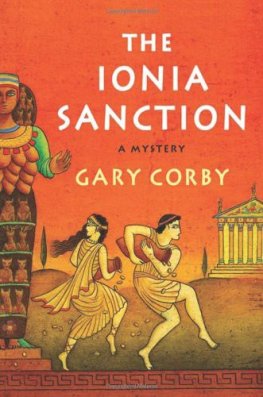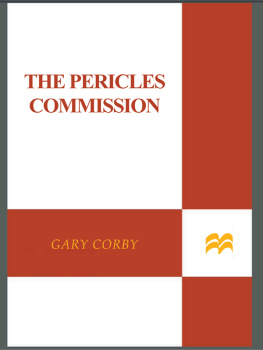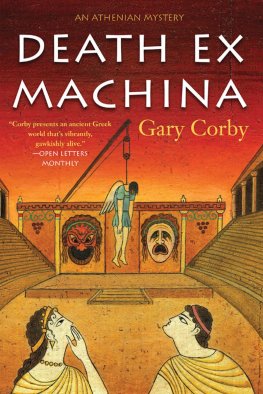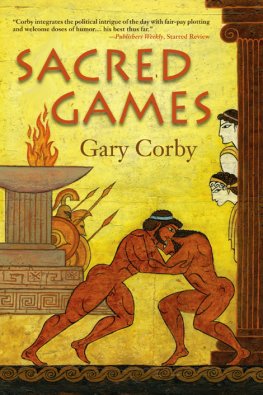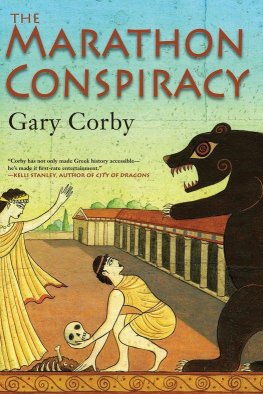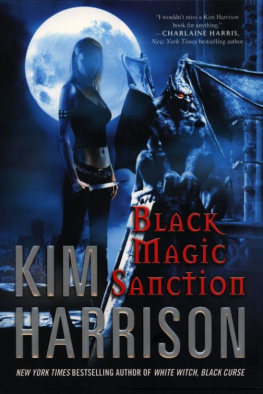Gary Corby - The Ionia Sanction
Here you can read online Gary Corby - The Ionia Sanction full text of the book (entire story) in english for free. Download pdf and epub, get meaning, cover and reviews about this ebook. year: 2011, publisher: Macmillan, genre: Detective and thriller. Description of the work, (preface) as well as reviews are available. Best literature library LitArk.com created for fans of good reading and offers a wide selection of genres:
Romance novel
Science fiction
Adventure
Detective
Science
History
Home and family
Prose
Art
Politics
Computer
Non-fiction
Religion
Business
Children
Humor
Choose a favorite category and find really read worthwhile books. Enjoy immersion in the world of imagination, feel the emotions of the characters or learn something new for yourself, make an fascinating discovery.
- Book:The Ionia Sanction
- Author:
- Publisher:Macmillan
- Genre:
- Year:2011
- ISBN:9780312599010
- Rating:4 / 5
- Favourites:Add to favourites
- Your mark:
- 80
- 1
- 2
- 3
- 4
- 5
The Ionia Sanction: summary, description and annotation
We offer to read an annotation, description, summary or preface (depends on what the author of the book "The Ionia Sanction" wrote himself). If you haven't found the necessary information about the book — write in the comments, we will try to find it.
The Ionia Sanction — read online for free the complete book (whole text) full work
Below is the text of the book, divided by pages. System saving the place of the last page read, allows you to conveniently read the book "The Ionia Sanction" online for free, without having to search again every time where you left off. Put a bookmark, and you can go to the page where you finished reading at any time.
Font size:
Interval:
Bookmark:
Gary Corby
The Ionia Sanction
ATHENS
1
Evil deeds do not prosper; the slow man catches up with the swift.
I ran my finger along one foot of the corpse, then the other, making the body swing with a lazy, uncaring rhythm. I stared at his feet, my nose so close I went cross-eyed as the toes swung my way.
He was like this when you found him? I asked.
I touched nothing, Pericles said, except to confirm Thorion was dead.
Are there any sons? I asked.
One, of twenty-four years. Hes at the family estate, according to the head slave.
Thorion had died hard. He hung from a rope tied to a crossbeam in the low ceiling. A stool lay toppled below. The fall was nowhere near enough to snap his neck; instead hed strangled. He must have changed his mind after the air was cut off, because there were deep red scratch marks in his throat where hed tried and failed to relieve the pressure. Yet his arms were long enough to have reached the beam to pull himself up and call for help. Why hadnt he?
There was no answer to my question, except the high-pitched wails and long, low moans that had assaulted my ears ever since I arrived. They came from the womens quarters across the inner courtyard. The wife and girl-children had begun screaming the moment theyd learned their husband and father was dead. They would screech, tear their clothes, and pull their shorn hair every waking moment until he was cremated. The caterwauling meant that by now the whole street knew Thorion was dead.
I stepped across to the narrow window facing onto the street. A small group stood below; citizens, and their slaves holding torches, the black smoke floating up to me with the distinctive bittersweet aroma of burning rag soaked in olive oil. The crowd would have entered the house by now but for the two city guards who stood at the door. The moment they were allowed, these neighbors would cut down Thorion and carry him to the courtyard, laying him out with his feet pointing toward the door to prevent the dead mans psyche from straying. Then the women would come downstairs to wash the body and dress it for eternity, with no more than three changes of clothes, as the law demands. They would place an obol in his mouth, the coin as payment for the ferryman of the dead, Charon, to carry Thorion across the Acheron, the river of woe.
The pressure would be building on the guards to let through the crowd and allow the rituals to begin. I might have only moments left to learn what I could.
Did you know him?
No, not really. Pericles handed me a torn scrap of parchment. This is the message which brought me.
THORION SAYS THIS TO PERICLES. I HAVE BETRAYED MY OFFICE AND MY CITY. NEWS OF A THREAT TO ATHENS. COME AT ONCE
.
Its not the sort of message anyone could ignore, Pericles said. The head slave led me up here to Thorions private office, where we found him dead. Is it reasonable for a man who intends suicide to summon someone he barely knows, purely to make him discover the body?
It might be if the man summoned is you. Pericles at the young age of thirty-three was recently elevated to leadership of the new democracy. Though he held no official position, already men came to him, to seek his approval before any important decision was made. I knew Pericles fairly well, might even claim to be a minor confidant, which was no easy position. The last time Pericles and I had been together in the presence of death, it had very nearly resulted in my own execution.
The slave boy who carried the message says Thorion had a scroll with handles carved as lion heads open before him. Thorion appeared upset, shocked even. It seems obvious whatever this news is, its written in the scroll, but theres no such scroll here. Ive looked. How could it have disappeared? Something is wrong.
Youre correct, something is indeed wrong. His feet are dry. I pointed at the dry floor beneath the corpse. Wheres the urine? Everyone knows a dying man releases whatever he holds.
Pericles shrugged. Not everyone does; not if they relieved themselves shortly before they died.
I lifted the hem of Thorions chiton, which fell all the way to his ankles. I kept lifting until I found what I sought, at thigh level. I took a big sniff.
He let go all right. Its on his thighs, but it didnt run down his leg.
Pericles stepped forward for a closer look, careful not to touch the body. He grunted. Youre right. He cast about the room, and so did I. Ceramics and pots and amphorae and jars stood on every possible surface, on benches and tables and even on the floor, giving the room more the look of a small warehouse than a mans private office. They must all have been imported; none had the look of the famous Athenian red figure pottery. Many appeared delicate and had small bases, yet not a single one was out of place or knocked over.
Whatever happened, there wasnt a fight.
I lifted each pot and shook to see if the missing scroll had been dropped inside. Only one amphora rattled, and it proved to hold three old coins, not even Athenian.
I got down on all fours and crawled about, paying particular attention to the areas where a man might ordinarily stand or sit. Pericles watched from the entrance as I nosed about like a hunting dog searching for scent.
Here, under the desk. The floor is damp, the smell is obvious.
Let me see. Pericles, not one to fret about form when an important matter was at stake, shoved me aside and checked beneath the desk for himself. He surfaced to say, It seems you are correct. Thorion died at his desk.
And likely was murdered to prevent him passing on this intelligence. How could a comfortable citizen in the middle of Athens come to learn of a threat to the city?
Pericles said, Do you know what a proxenos is?
A citizen who acts for another city.
A citizen who represents the interests of another city in its dealings with Athens. Thorion is was the proxenos for Ephesus.
Ephesus is a major city, across the sea on the east coast of the Aegean. The Ephesians speak Greek-theyre as Hellene as we Athenians-but their city lies just within the Persian Empire.
You think the summons had something to do with Ephesus.
Dont you? Every proxenos receives regular news from his client city.
I nodded. If your theory is good, then Thorion received letters today.
Pericles summoned the head slave of the household.
The man was thin, balding, and middle-aged. He shook with dread as his dead master hung before his eyes, and the most powerful man in Athens stared at him grim-faced. At twenty-one I was unimportant, and certainly less threatening to a slave, so I said, Did your master receive any letters or packages today?
The slave turned to me and said, Oh, yes sir. The regular courier from Ephesus arrived at dusk, straight from the boat. He still smelled of the sea.
Youve seen this man before?
The same man always brings the mailbag, sir.
I glanced at Pericles. He glanced at me. This was progress.
Was that when you last saw your master alive?
No sir, he was alive when I announced the second courier.
The second courier?
The first left, taking the mailbag with him back to Ephesus. The master stayed in his office. I was summoned again later to bring a boy, and the master gave him a note for Pericles.
Pericles nodded.
Then a second courier walked in as the boy went out the door, I hadnt even time to shut it. The second courier said he had an urgent message, sir, from Ephesus.
What did Thorion say to that?
Its never happened before, sir. The master was startled when I told him.
This second man must have given a name.
Araxes, sir. He said his name was Araxes.
Did he too smell of the sea?
The slave thought for a moment. Yes sir, now that you mention it, he did. He stayed longer than the first-I suppose he had more to say-and when he walked down the stairs he told me the master didnt wish to be disturbed until supper. I opened the door for him and he left.
Font size:
Interval:
Bookmark:
Similar books «The Ionia Sanction»
Look at similar books to The Ionia Sanction. We have selected literature similar in name and meaning in the hope of providing readers with more options to find new, interesting, not yet read works.
Discussion, reviews of the book The Ionia Sanction and just readers' own opinions. Leave your comments, write what you think about the work, its meaning or the main characters. Specify what exactly you liked and what you didn't like, and why you think so.

